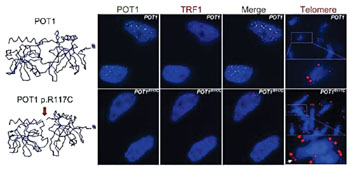Mutated Gene Found in Families with Multiple Tumors
By LabMedica International staff writers
Posted on 06 Oct 2015
Cardiac angiosarcoma (CAS) is a rare but malignant disease and in the case of hereditary CAS, the median survival expectancy is only four months because the disease is diagnosed at an advanced stage. Posted on 06 Oct 2015
No genes responsible for CAS cases have been identified so far, thus hampering early diagnosis and effective treatment, which involves surgical excision combined with chemotherapy, and heart transplantation only for patients with no evidence for metastasis.

Image: The replacement of the amino acid arginine by a cysteine at position 117 in POT1p.R117C produces conformational changes in the protein that are incompatible with an efficient connection to the telomere, inducing an aberrant telomere elongation and fragile telomeres in the mutated cells (Photo courtesy of CNIO).
Scientists at the Spanish National Cancer Research Center (CNIO; Madrid, Spain), and their colleagues selected index cases from Li–Fraumeni-like (LFL) families negative for mutations and large deletions of the tumor protein 53 (TP53) gene. Three of the families had members affected with CAS plus other tumors. The rest of the families fulfilled the LFL criteria but they did not have any member with a CAS tumor. A group of 1,520 samples from a Spanish control population was used for genotyping the protection of telomeres 1(POT1) variant by denaturing high performance liquid chromatography.
The team used a multiplicity of techniques to find a novel damaging missense variant (p.R117C) in the POT1 gene in TP53-negative LFL families with CAS and other tumors. The discovery of the new mutation proved to be even more significant from a clinical perspective, given that it identified carriers at risk of developing cardiac angiosarcoma and possibly other tumors. The study confirms that POT1 plays a novel role in the development of different forms of hereditary cancer. The key is in the telomeres. When anomalies occur in the telomeres, the chromosomes become unstable, this, in turn, leads to extended genomic instability. POT1 is a central component of the telomeres that functions incorrectly when mutated.
Javier Benítez, PhD, a senior author of the study, said, “In the past, we simply didn't have anything that could help in identifying these people at risk, because there were no markers for familial CAS or for families with a syndrome similar to Li-Fraumeni without P53 mutations. This study uncovers one of the genes that explains the high incidence of cancer in some of them. The translation of these results into the clinic is immediate. In fact, we are already helping families that carry this mutation.” The study was published on September 25, 2015, in the journal Nature Communication.
Related Links:
Spanish National Cancer Research Center














